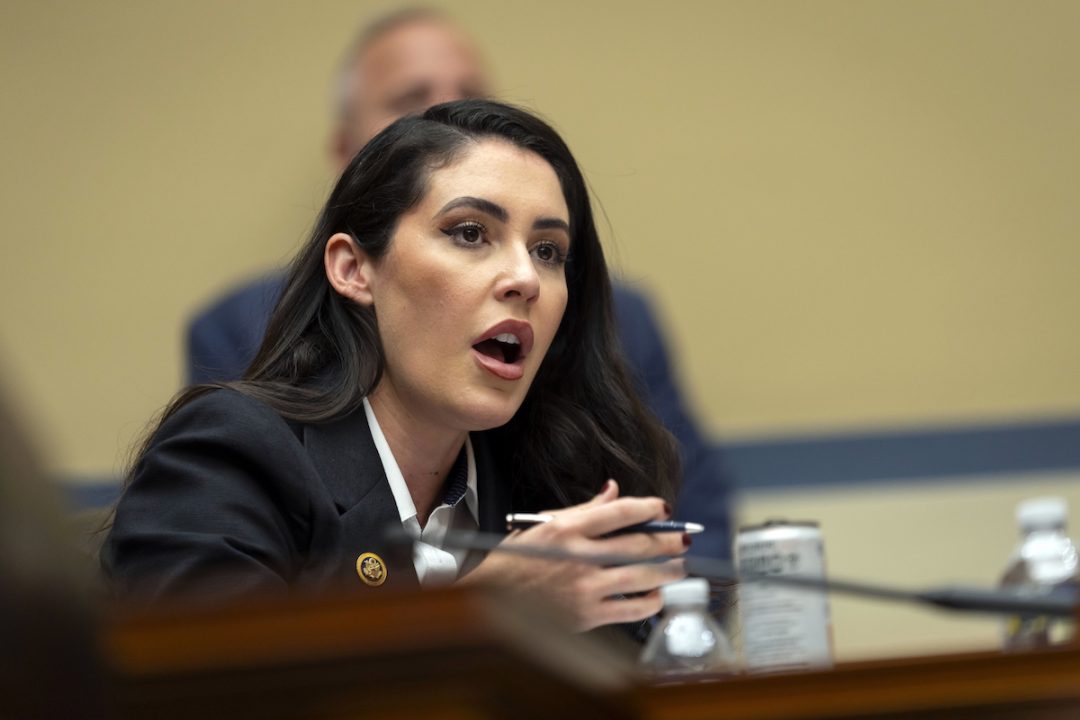
Representative Anna Paulina Luna (R-Fla.) introduced legislation last week to repeal the Patriot Act, a post-9/11 assault on the Constitution that the government has used to vacuum up information on millions of innocent Americans.
Luna — who, in just 28 months in Congress, has racked up an impressive 94-percent score on The New American’s Freedom Index — said in a May 7 press release:
For over two decades, rogue actors within our U.S. intelligence agencies have used the Patriot Act to create the most sophisticated, unaccountable surveillance apparatus in the Western world. My legislation will strip the deep state of these tools and protect every American’s fourth amendment right against unreasonable searches and seizures.
Unpatriotic Act
Luna was not exaggerating. In his 2007 book The Constitution in Exile, Andrew Napolitano called the Patriot Act “directly and profoundly offensive to our Constitution.”
“The Patriot Act and its progeny,” he wrote, “are the most abominable, unconstitutional assaults on personal liberty since the Alien and Sedition Acts of 1798.”
Essentially a Deep State wish list, much of which had failed to pass on previous attempts, the Patriot Act was rushed through Congress in the weeks following the 9/11 attacks. Lawmakers probably spent more time coming up with the bill’s ridiculously contrived acronym — the Uniting and Strengthening America by Providing Appropriate Tools Required to Intercept and Obstruct Terrorism (USA PATRIOT) Act — than they did reading and debating its text. Indeed, in what may be the most egregious example of passing a bill to find out what’s in it, senators and representatives didn’t even get to see the bill until just before it was put to a vote. All they had to go on was a summary provided by the Justice Department, which, of course, was salivating over all the power it was about to receive.
In the end, only one senator had the courage to vote against the bill. Sixty-six congressmen opposed it; only three were Republicans.
Some of this, especially in the House of Representatives, could be attributed to partisanship. President George W. Bush, whose administration desperately wanted the bill to pass, was a Republican.
But fear of another 9/11 also played into it. Then-Attorney General John Ashcroft threatened to make Congress the scapegoat should another terrorist attack occur, telling the House Judiciary Committee:
Every day that passes with outdated statutes and the old rules of engagement … is a day that terrorists have a competitive advantage. Until Congress makes these changes, we are fighting an unnecessary uphill battle
Big Brother’s Bonanza
Ashcroft got his wish. The Constitution got the shaft.
The Patriot Act gave the government sweeping powers to spy on Americans’ telephone calls, emails, and even what they were borrowing from public libraries. It authorized government agents to conduct “sneak and peek” searches, in which law enforcement searches or even seizes an individual’s property without informing him, it broke down privacy protections so federal agencies could more readily share information, it allowed the super-secret Foreign Intelligence Surveillance Court to okay the monitoring of Americans’ communications, and it gave the Federal Bureau of Investigation the power to issue its own search warrants, known as National Security Letters, which recipients were forbidden to reveal.
Perhaps the most famous example of Patriot Act perfidy — because of its breadth — is the National Security Agency’s (NSA) vast worldwide surveillance operation revealed by former NSA contractor Edward Snowden in 2013. For his trouble, Snowden was rewarded with exile in Russia to avoid federal prosecution.
There have, of course, been many other abuses of the Patriot Act, most of which will never be known to the public. Moreover, those abuses undoubtedly continue to occur. Notes the Electronic Privacy Information Center:
The Patriot Act was written with “sunset” provisions requiring Congress to re-authorize the program every few years. Although the Act expired in March, 2020 without being reauthorized, federal law enforcement agencies retain most of the authorities granted by the act. The surveillance infrastructure that the Patriot Act created exists to this day.
Trading “Security” for Liberty
Luna’s bill, therefore, is sorely needed. Unfortunately, observed the Cato Institute’s Patrick Eddington, it faces some very stiff headwinds:
While the leadership at the National Security Agency, the Central Intelligence Agency, and the Federal Bureau of Investigation will likely strongly oppose her efforts, Luna’s greatest obstacle is going to be the congressional leadership — on both sides of the aisle.
Last year, it was the party leadership in both chambers that played the key role in passing an expansion of federal government surveillance under Section VII of the Foreign Intelligence Surveillance Act (FISA). Luna will need allies among fellow Republicans and (mostly) progressive Democrats to have a shot at getting a hearing in the House Judiciary Committee for her legislation, and given the generally pro-National Security State stance of the GOP and Democratic leadership in the House and Senate, Luna has her work cut out for her … but she deserves credit for keeping the issue of federal government surveillance reform alive in this Congress.
Thus far, only one other person is known to be cosponsoring Luna’s legislation. In a Thursday X post, Luna thanked Congressman Eric Burlison (R-Mo.) for signing onto her bill.
The last word on the bill goes to Luna herself:
It’s past time to rein in our intelligence agencies and restore the right to privacy. Anyone trying to convince you otherwise is using “security” as an excuse to erode your freedom.




